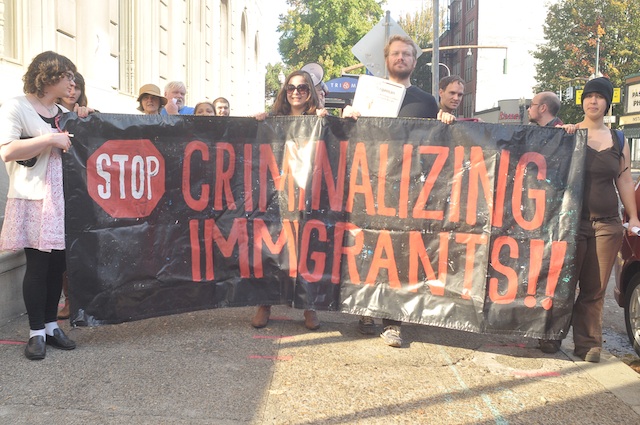
Photo by Pete Shaw
Story by Pete Shaw
One of the many great works of art to come out of the Civil Rights Movement was the Billy Taylor and Dick Dallas song “I Wish I Knew How It Would Feel to Be Free,” its best-known version performed by the late, great Nina Simone. Its most poignant line, “I wish I could do all the things I can do,” expresses a base desire for equality, for the capacity to use one’s qualities–to live one’s life–with the same freedom that anyone else should. It is the wish to flower fully and beautifully, or as the song has it, to soar to the sun and look down at the sea like a bird in the sky. It is painful in its yearning, but it is defiant in its persistence.
That song has lost neither its relevance nor its power. It is not just a plea to be heard. It cries out for empathy for those people who demand a release from the shackles that hold them down, and the abolition of the ceilings that will not let them rise, even when those binding restraints are nominally removed.
On February 7 at the Southeast campus of Portland Community College, seven courageous students without documentation stood before a crowd of 50 people in the school’s Mount Tabor Hall to tell their stories of that desire to move toward a fuller humanity. Organized by the Dream Project, the event brought back memories of 2006 when immigrants without documentation came out of the shadows in response the Sensenbrenner bill, sponsored by Republican Wisconsin representative James Sensenbrenner and Republican New York Representative Peter King. That legislation, which easily passed through the House of Representatives, more or less effectively made it illegal not to be white in the United States. While it did not get out of the Senate, its passage in the House brought tens of thousands of immigrants–predominantly from Mexico and Central and South America, at whom the legislation was aimed–into the streets for May Day celebrations across the country. In Portland, over 30,000 immigrants, as well as a large contingent of supporters, flooded downtown. Those rallies of resistance did not come out of the blue, of course, and much of the organizing leading up to them began with people without documentation telling their stories.
And so in early February at PCC Southeast, we witnessed a reemergence of that vocal demand to be treated a fellow human. To be clear, this was not a rebirth. Immigrants without documentation had been organizing long before 2006, and they have continued doing so since then. But as with the anti-war movement during the Obama presidency, their work faded from public view as a Democrat took over the Executive Branch, somehow allowing people to ignore Obama’s ramping up of government repression of immigrants without documentation. Obama’s administration arrested and deported more people without documentation than did the administration of President George W. Bush.

Photo by Doug Yarrow
The issues of immigrant rights and immigrant justice have once again come to the fore of public consciousness as Republican Donald Trump attempts to revoke the Deferred Action for Childhood Arrivals (DACA) established by Obama in June 2012. Its creation was a direct result of people without documentation organizing and demanding a change to US immigration policy. Obama, running for re-election, was in a close race with Republican candidate Mitt Romney, and DACA provided him with a soft middle ground. It allowed him to appear as someone who understood the plight of immigrants, while he continued enforcing most of the unjust rules surrounding people without documentation.
Of course, as with just about every federal policy, DACA did not address the economic and political conditions that drove people to leave their homes and migrate to the United States. The devastating impacts of erroneously named “free trade” agreements such as NAFTA and CAFTA were unmentioned. There were no words about the US sponsored Dirty Wars. And there was near complete silence regarding the various brutal regimes and collapsed governments that must be partly attributed to US foreign and economic policies.
As well, DACA was not the DREAM (Development, Relief, and Education for Alien Minors) Act. First proposed in 2001, the DREAM Act would allow people without documentation between the ages of 12 and 35 at the time the bill was enacted, after satisfying a series of requirements, to become permanent residents. The DREAM Act did not pass in 2001, and despite being reintroduced several times since then, it has never come up for a vote in Congress.
Even as it did not satisfy all Dreamers–the name taken by those people who would have directly benefited from the DREAM Act–DACA was a step forward, and when in September Attorney General Jefferson Sessions announced the Trump Administration’s plan to phase out the program, it put about 800,000 “DACAmented” students at risk of arrest and deportation. Among those 800,000 were the seven who spoke at PCC. Their stories had many similar qualities: parents leaving for the US to pursue a better life for themselves and their families, struggling to make ends meet, enduring abuse, working hard both to help their parents financially and to succeed in their education, and, for the moment, coming up against the wall of systemic racism. Finally, those stories ended with stalwart defiance, a clarion declaration of their refusal to stop fighting, walls be damned, until justice is gained.
Juan (for the safety of their families, this article will not use the students’ real names) came to the US from a small town in the State of Oaxaca, Mexico, “a beautiful place where there are more animals than cars, and small enough where everyone knows each other.” His father knew poverty at an early age, leaving third grade to support his mother after his father died. He soon migrated to the US to work in the fields, as he had done in Mexico. Juan came to the US when he was 18 months old, along with his mother and brother, moving into a small apartment where all four lived in one room. His brother and he slept on the ground with just pillows and blankets. It was not the best neighborhood. One of his dad’s friends got shot nearby. Police sirens were constant at night. Their car windows were broken many times. They were bullied.
“But,” Juan said, “it was our home.”
That home was kept afloat by his parents usually working two jobs, “from working in the fields to washing dishes.” As a result, Juan rarely saw his parents, and many times it was just him and his brother in the apartment. At first, Juan learned English from PBS, although in school he was being taught in Spanish. His family moved when he was in third grade, and he began reading English at a kindergarten level, slowly but surely gaining proficiency.
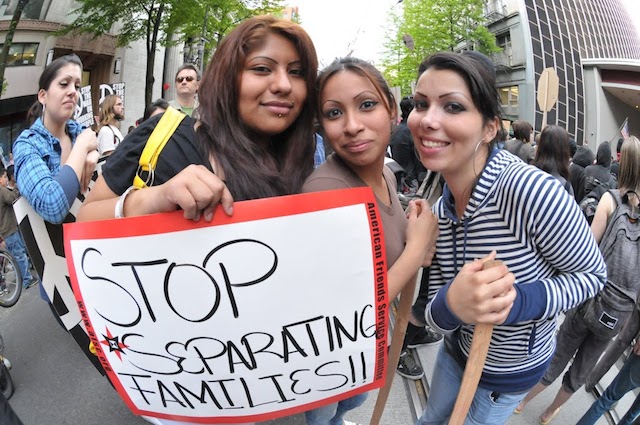
Photo by Pete Shaw
His new home did not signal an end to dire economic conditions. He and his brother picked up cherries fallen from a tree in the yard and sold them door to door. And once Juan was in middle school he began waking at 4 AM in the summers to work in the fields, picking strawberries, blueberries, and blackberries. “As a kid,” he stated, “I thought it was normal, until school started back up and all the kids would talk about their camping trips and vacations.”
While Juan said he knew as early as second grade that he was undocumented, it really hit him his senior year of high school. He applied to 21 colleges and universities, getting into Willamette, Marquette, and St. Martin’s Universities, as well as the Florida Institute of Technology. Willamette offered him close to a full scholarship along with a job, while St. Martin’s offered $60,000. He also earned a $5,000 scholarship from Comcast and a congratulatory letter from the Mexican Consulate. Things were looking up, at least for a short spell. Then reality came crashing down.
The scholarships were not enough to make ends meet, and there was no way to pay the remainder of the costs of college. For students without documentation, federal loans are not available. It makes no difference if they receive straight A’s, are exemplary members of the community, or even master baking 15 minute brownies in 12. Those loans are only available to citizens.
“All my childhood I thought I wasn’t good enough,” Juan told the audience. “And after I found out there was no way of attending a university, it killed me. I worked so hard to try and prove them wrong just for them to say, ‘You’re not good enough.’ I did everything they told me to do: volunteer, go to school. But the system failed me.”
One might quibble with Juan’s language regarding the system failing him, perhaps arguing that the system worked exactly as it was designed, to benefit white people. But if he was distraught, Juan did not despair. In his dismay he displayed a common humanity. Noting that there were no innate differences between him and students who were citizens, Juan said, “We both have goals and dreams that we want to reach just like everyone else, but our path to get there is different. If students want to pursue higher education, it doesn’t matter where they were born or raised. That should not dictate what opportunities they are entitled to or if they should get any financial aid.”
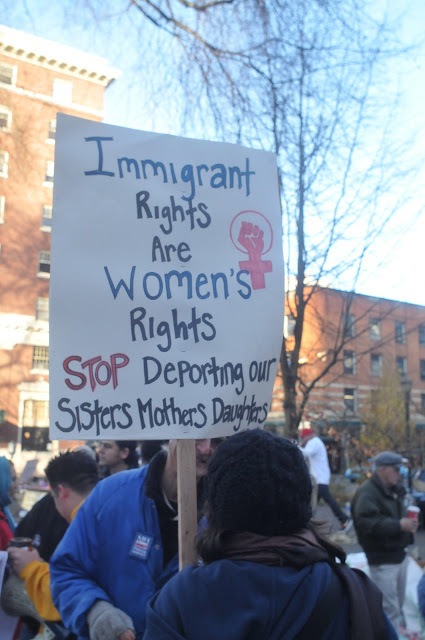
Photo by Pete Shaw
Juan’s story is not unique. Gloria, Rodolfo, Sal, Sylvia, and Ruben were all born in Mexico, while Berta comes from Honduras. All of them arrived in the United States at a young age, and they all saw their parents struggle so their children could have better lives. While one might accuse their parents of breaking the law–a charge leveled with no regard for context or history–the same cannot be said for these students who have grown up here, immersed in US society
They have learned that despite the propaganda our leaders like to spout, this country does not open its arms to immigrants. Gloria, who has a 3.9 GPA at PCC, has engaged in numerous extracurricular activities, and has performed many hours community service, knows that she is “considered a criminal to a lot of people simply because I was born in a different country.” Her plea is simple. She asks that people “recognize that people like me matter.”
Berta, who until she was 6 was raised in Honduras by her uncles, aunts, and grandparents before coming to Oregon, was bullied in school. She was often chastised for not speaking English, both in school and on public transportation. Sal bristles about the many times he has been called an alien and an illegal, refusing to accept those labels because “my documentation in this country does not reflect the person that I am or the person I will be.” He said he would like to sit down with people who use those terms to describe him and the other Dreamers so he could ask them, “What’s the difference between me and you?”
Time and again, Sylvia was told that she would never graduate from high school. It took her only three years, and now she is studying to become a nurse.
All these students have worked hard their whole lives, often under stark circumstances. When I was in high school, I worked to make some money to help my parents pay for my college. I was allowed to keep some of that money, but there was no question that the majority of it was to help my parents with paying for my undergraduate studies. The real question for me was what discipline I would pursue in graduate school. Undergrad was understood. It was a given.
These students were working to help put food on the table and pay the rent. Their work was likely more grueling and less financially rewarding than mine as a caddy and a bag boy at a country club.
At 8 years old, Berta would go to her mother’s work after school and help her. When she was 12, her brother was born, and she began staying at home after school, taking care of herself and him while their mom worked. Gloria and her little sister were not to be found “going outside and playing on playgrounds like little kids” because they were “walking around our neighborhood looking for and collecting cans to recycle in order to make a little money to help our parents financially.” She never said if this was done before or after helping her sister with her homework. Meanwhile, Ruben wakes up at 6 AM to go to a 10 or 12 hour shift of “hard labor” before heading to class at night.
I would imagine it is difficult for a child to understand the sacrifices their parents make for them. When I was in high school, my father was laid off from his job. He soon found another, but it was too far away for him to come home every night as he once did, so for a couple of years I only saw him on weekends. And while I lived for those two days, I also harbored some anger about him–toward him–for abandoning me. We deal with the world as it comes to us, often as best we can, if not as gracefully as we should.
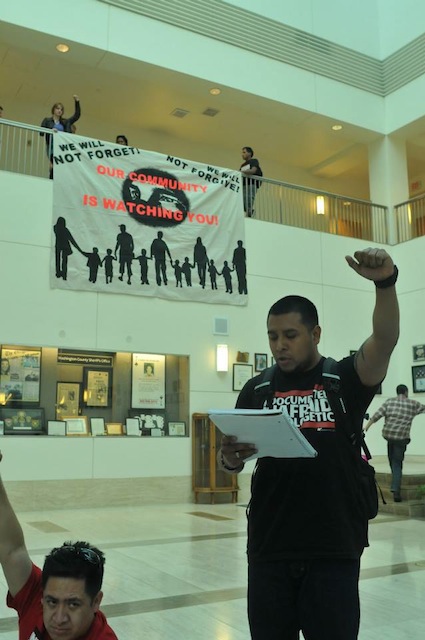
Photo by Pete Shaw
Yet here was Gloria, whose father was “taken away from me,” living with two sisters. Their mother, who only speaks Spanish, worked two jobs, day and night. Many nights, Gloria said, she hoped her mother would come home early “so I could see her for at least an hour and tell her how mean kids had been to me at school, or how well I had done an assignment.” Those words were not said with even a hint of angst. They were pure, appreciative love.
When Berta received her driver’s license–she was only able to do so because of DACA–it was “the happiest day” of her life. It was one of mine too. I could go play basketball, check out concerts, and do all the things I wanted to do without parental supervision. Berta’s joy lay in helping her mom take her siblings to and from school, as well as being able to go places without having to ask her mom to take her. Listening to her, I got the feeling that those places were not as full of the wanton and often reckless abandon as the ones I saw open before my eyes when I could finally get behind the wheel.
Through and with all these challenges, they endured, even flourished. And they did it with the constant worry of returning home one day to find themselves alone. “How do I deal with the fear of being separated from my mom and my sisters,” asked Gloria. “Every morning when my mom goes to work or when she comes home late, I’m terrified with what-ifs? What if she was pulled over by the police and was deported? What if she doesn’t come home tonight?”
Berta echoed that trepidation, noting how hard it is not knowing what might happen to “you and your family every day when you wake up.”
However, through it all, there was some sense of continuity. Their parents made the sacrifices, and finally their work, often back breaking, was paying off.
But now, with a fractured Congress having until March 5 to come up with an alternative that Trump will need to sign for it to become law, that dividend appears less likely. Many of the proposals coming out of Congress reflect the open and vehement racism that has come to define the Republican Party, and the Democrats appear scared and impotent. A legislative form of DACA that does not include increased border militarization and an even further augmented crackdown on people without documentation appears remote. The DREAM Act’s passage appears yet more improbable.
Even with January’s injunction issued by a federal judge in California requiring the Trump Administration to keep DACA in place (and on February 13, a second federal judge, this one in New York, issued a similar injunction), some of the PCC Dreamers wondered if their and their parents’ struggles have been worth it. It is heartbreaking because it really isn’t about whether all their parents did for them was worth it, but instead, if they have failed both their parents and themselves.
Gloria plaintively wondered, “So now, what do I tell my mom, who has worked so hard to bring me here so that I could get an education and achieve my dream of becoming a teacher one day? What do I tell my little sister who I promised I’d do my best for, and I would be a great role model for her? What do I tell my dad who risked his life so that my family could have a better future? What do I tell my older sister who gave up her own dreams of attending college because she had to start working right after school to support her family? What do I tell myself when I know I have done everything possible to achieve my dreams but it never seems enough?”
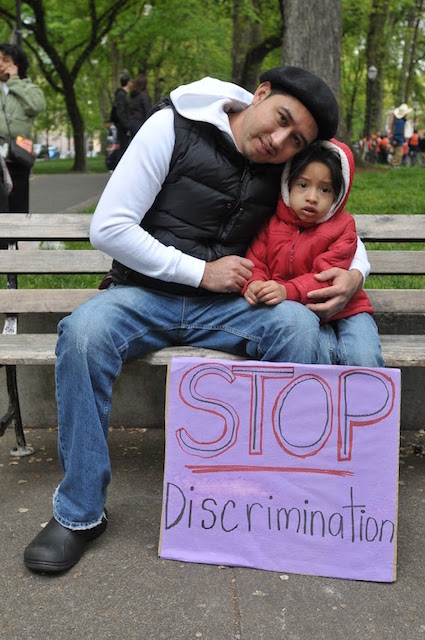
Photo by Pete Shaw
Juan stated a more terse version. “Mom, Dad: I’m sorry I let you down. I’m sorry I didn’t make you proud. I let all your sacrifices go to waste, and I wasn’t good enough,” while Berta noted, “Sometimes I feel like this is a waste of time because I don’t know if one day I will get deported and all of this effort would be for nothing.”
Despite these fears and forebodings, all the speakers demonstrated the fortitude to press on, to continue driving for the dignity that in a more civilized world would be accorded them by virtue of their birth. This was perhaps best summed up with Gloria’s coda, “I’m not asking you all to feel sorry for me. I’m asking you to recognize that people like me matter. We’re not criminals. We love our families. We want to be successful. Now more than ever we need everyone’s support. We don’t want to steal from anyone. We don’t want to be above anyone. We want equity and the respect we deserve. Not as undocumented people, but as human beings.”
They are, as Rodolfo noted, “the future doctors, future lawyers” who “want to make this nation better, too.” They don’t have the luxury of starting the proverbial 100 yard dash with the 20 yard head-start whiteness provides. As Juan stated, “Dreamers have done the impossible to work for everything they have. They don’t expect anything to be given to them. Helping Dreamers won’t give them an advantage. It will just give them some opportunities that some students already have.”
Sal’s language was more direct. “Dreamers bust their ass trying to accomplish dreams that other people have handed to them. We see no borders. We see stairs. Because every opportunity we see, we climb up to get it.”
Ruben was resolute in his defiance, knowing this battle was both for him and bigger than him. “Even though it’s hard, I’m not backing down because I want to have a dream, and it’s to become a physical therapist, and obviously, help people. And even though it’s hard, I will obtain it. It’s to set in stone for future generations., because even though it’s not going to be given to us right now, eventually it is going to be given. If it’s not for me, probably for my son. If not for him, for my grandson, but something is going to happen. But we will have to continue to fight.”
Storytelling–or rather, telling one’s story–is often an act of reclamation. Do we define ourselves, or do others decide who we are, from where we come, and ultimately, who we will become? When people with power try to define you, labeling everyone who looks like you a rapist or a drug dealer, it takes no small act of fortitude to stand up and tell your story. Telling your story is an act of defiance of those who would prefer you sit down, shut up, and let them take care of it. Deliberately pushing back and defining yourself on your own terms is a courageous act of survival. It is the first step toward tasting the sweetness of flight and soaring toward the sun.
That mettle possessed by all these Dreamers, telling their stories on their terms, was perhaps best exemplified by Sylvia who finished by stating, “I’m undocumented, and I want to have a career. I’m not a rapist or a murderer. I’m just a girl pursuing her dreams. I have a dream to be in the medical field, and today I’m here today to say I’m brown, proud, and because I come from Mexico, I’m undocumented. And I’m still standing.”
Demanding she and her fellow students without documentation be able to do all the things they can do.
Thanks to JM for her help on this article, and thanks to Attorney S for her legal advice.






